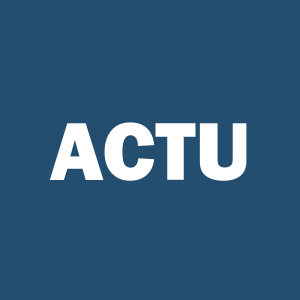Actuate Therapeutics Shares Highlights from KOL Event on Positive Topline Elraglusib Phase 2 Data in First-Line Treatment of Metastatic Pancreatic Cancer
Rhea-AI Summary
Positive
- Significant increase in median overall survival to 10.1 months vs 7.2 months (p=0.01)
- Doubled 12-month survival rate to 44.1% vs 22.3%
- 37% reduction in risk of death (HR = 0.63)
- Favorable safety profile with mostly Grade 1-2 adverse events
- Improved overall response rates (29.0% vs 21.8%)
- Strong continued survival benefit at 18 and 24 months
Negative
- Most frequent treatment-related adverse events included visual impairments in about two-thirds of patients
- Presence of Grade 3 or higher neutropenia
- Modest improvement in progression-free survival (5.6 vs 5.1 months)
News Market Reaction
On the day this news was published, ACTU declined 11.01%, reflecting a significant negative market reaction.
Data tracked by StockTitan Argus on the day of publication.
- Expert Insights on Clinical Relevance and Scientific Rationale
- The replay of the event is available on the Investor Relations section of the Actuate website
CHICAGO and FORT WORTH, Texas, June 02, 2025 (GLOBE NEWSWIRE) -- Actuate Therapeutics, Inc. (NASDAQ: ACTU) (“Actuate” or the “Company”), a clinical-stage biopharmaceutical company focused on developing therapies for the treatment of high-impact, difficult-to-treat cancers through the inhibition of glycogen synthase kinase-3 beta (GSK-3β), today announced key takeaways from its Key Opinion Leader (KOL) event held on May 31, 2025 discussing the positive topline results from the Phase 2 (Actuate-1801 Part 3B) trial of elraglusib in combination with gemcitabine/nab-paclitaxel (GnP) in previously untreated patients with metastatic pancreatic ductal adenocarcinoma (mPDAC).
The study met its primary endpoint, demonstrating a clinically meaningful increase in median overall survival (mOS) of 10.1 months compared to 7.2 months (p = 0.01), with a
The KOL event followed the presentation of topline trial data during an oral session at the American Society of Clinical Oncology (ASCO) Annual Meeting. The event featured a fireside discussion with leading mPDAC clinicians, all with direct participation in the elraglusib clinical trial program: Colin Weekes, MD, PhD, Massachusetts General Hospital; Devalingam Mahalingam, MD, Northwestern University Feinberg School of Medicine; Rachna Shroff, MD, MS, FASCO, University of Arizona Cancer Center; Tanios Bekaii-Saab, MD, FACP, Mayo Clinic College of Medicine and Science.
The panelists highlighted the implications of the Phase 2 Actuate 1801 Part 3B results in the broader context of the unmet need in mPDAC, the unique immune-modulating mechanism of elraglusib, and its potential to reshape the treatment landscape, as follows.
Daniel Schmitt, President & Chief Executive Officer of Actuate said, “The reception we received at ASCO confirms what we already believed - this data has the potential to change the trajectory of mPDAC treatment. As our KOLs highlighted in the panel discussion, there is a clear need for new drugs, like elraglusib, with new mechanistic pathways, and which can be successfully combined without overlapping toxicities for treatment of this devastating disease. As these thought leaders pointed out, due to a number of negative trials, there has been quite some time since we’ve had anything that improves outcomes for patients with these chemotherapy backbones. The thought leaders further highlighted the importance of the overall survival benefit and noted the magnitude of that benefit in the elraglusib trial is actually substantial. We are now laser-focused on turning this promise into patient access. With a clear survival benefit, favorable safety profile, and strong scientific rationale, we look forward to advancing elraglusib development and initiating regulatory discussions with both the FDA and EMA.”
Key highlights from the ASCO oral presentation:
- In addition to the improved mOS and one-year survival rate, a continued survival benefit was also observed at eighteen and twenty-four months (survival rates of
19.7% vs4.4% and13.8% vs0% in the elraglusib/GnP combination arm vs the GnP arm, respectively). - The elraglusib/GnP combination treatment also resulted in numerically improved overall response rates (
29.0% in the elraglusib/GnP combination arm vs21.8% in the GnP arm) and improvements in median progression-free survival and median duration of response of 5.6 months vs 5.1 months, and 5.5 months vs 4.0 months in the elraglusib/GnP combination arms vs GnP arms, respectively. - The trial also met its primary safety endpoint. Treatment-emergent adverse events (TEAEs) and Serious Adverse Events (SAEs) in the elraglusib/GnP combination arm were similar to those observed in the GnP arm, indicating a favorable risk-benefit profile for the elraglusib/GnP combination.
- Treatment-related adverse events (TRAEs) were mostly Grade 1-2, with the most frequent TRAEs observed (in about two-thirds of patients) being transient visual impairments that were reversible and non-progressive
- While Grade 3 or higher neutropenia was observed, similar rates of febrile neutropenia and sepsis were observed in both treatment arms.
- Pre-dose cytokine analysis that suggested lower baseline levels of key immune modulators, including CCL3, IL-1α, IL-18, TGF-β, and TRAIL R3, were correlated with improved 1-year survival.
- Increased CD8-positive and granzyme B-positive T cells, increased NK cells, and decreased myeloid-derived suppressor cells were observed in tumor biopsies only from elraglusib-treated patients. This exploratory result confirms elraglusib proposed immune modulating mechanism of action in patients with mPDAC.
About Actuate-1801 Part 3B Study
The Actuate-1801 Part 3B study (NCT03678883) is a randomized, controlled Phase 2 trial of elraglusib with GnP versus GnP alone in first-line mPDAC. The trial enrolled 286 mPDAC patients with no prior systemic treatment for metastatic disease, who were randomized 2:1 to the elraglusib treatment arm (elraglusib + GnP) or the control arm (GnP alone). Elraglusib is administered at a dose of 9.3 mg/kg by IV infusion on Day 1 of each week of a 28-day cycle. The primary endpoint for this study is median overall survival, with OS summarized throughout the study by estimates of 1-year survival. Secondary endpoints are DCR, ORR, PFS, and AE.
Inhibition of GSK-3β may inhibit tumor growth and improve survival through several complimentary mechanisms that include enhancement of chemotherapy activity, activation of innate anti-tumor immunity, and regulation of gene expression, leading to alterations in tumor metabolism and Epithelial-to-Mesenchymal Transition (EMT).
About Actuate Therapeutics, Inc.
Actuate is a clinical-stage biopharmaceutical company focused on developing therapies for the treatment of high-impact, difficult-to-treat cancers. Actuate’s lead investigational drug, elraglusib (a novel GSK-3β inhibitor), targets molecular pathways in cancer that are involved in promoting tumor growth and resistance to conventional cancer drugs such as chemotherapy through the inhibition of nuclear factor kappa-light-chain-enhancer of activated B cells (NF-kB) and DNA Damage Response (DDR). Elraglusib may also mediate anti-tumor immunity through the regulation of multiple immune checkpoints and immune cell function. For additional information, please visit the Company’s website at http://www.actuatetherapeutics.com.
Forward-Looking Statements
This press release contains forward-looking statements about us, including our and other parties’ clinical trials and development plans, and our industry. The words “anticipate,” “believe,” “continue,” “could,” “estimate,” “expect,” “intend,” “may,” “might,” “ongoing,” “plan,” “potential,” “predict,” “project,” “should,” “target,” “will,” “would,” or the negative of these terms or other comparable terminology are intended to identify forward-looking statements, although not all forward-looking statements contain these identifying words. All statements, other than statements related to present facts or current conditions or of historical facts, contained in this press release are forward-looking statements. Accordingly, these statements involve estimates, assumptions, substantial risks and uncertainties which could cause actual results to differ materially from those expressed in them, including but not limited to that preliminary and unpublished data may be subject to change and further interpretation following the availability of more data or following a more comprehensive review of the data and should not be relied upon as a final analysis; the risk that clinical trial data are subject to differing interpretations and assessments by regulatory authorities and within the medical community; clinical and preclinical drug development involves a lengthy and expensive process with uncertain timelines and outcomes, results of prior preclinical studies and early clinical trials are not necessarily predictive of future results, and elraglusib may not achieve positive clinical results or favorable preclinical results, and we may not be able to make regulatory submissions or receive regulatory approval on a timely basis, if at all; that we may not successfully enroll additional patients or establish or advance plans for further development, including through conversations with the FDA or EMA and the standards such bodies may impose for such development; that elraglusib could be associated with side effects, adverse events or other properties or safety risks, which could delay or preclude regulatory approval, cause us to suspend or discontinue clinical trials or result in other negative consequences; our reliance on third parties to conduct our non-clinical studies and our clinical trials; our reliance on third-party licensors and ability to preserve and protect our intellectual property rights; that we face significant competition from other biotechnology and pharmaceutical companies; our ability to fund development activities, including because our financial condition raises substantial doubt as to our ability to continue as a going concern and we require additional capital to finance our operations beyond the second quarter of fiscal year 2025, and a failure to obtain this necessary capital in the near term on acceptable terms, or at all, could force us to delay, limit, reduce or terminate our development programs, commercialization efforts or other operations. In addition, any forward-looking statements are qualified in their entirety by reference to the factors discussed under the heading “Item 1A. Risk Factors” in our Annual Report on Form 10-K for the year ended December 31, 2024, filed with the SEC on March 13, 2025, our Quarterly Report on Form 10-Q for the quarter ended March 31, 2025, filed with the SEC on May 15, 2025, and other filings with the SEC. Because the risk factors referred to above could cause actual results or outcomes to differ materially from those expressed in any forward-looking statements made by us or on our behalf, you should not place undue reliance on any forward-looking statements. Further, any forward-looking statement speaks only as of the date on which it is made. New factors emerge from time to time, and it is not possible for us to predict which factors will arise. In addition, we cannot assess the impact of each factor on our business or the extent to which any factor, or combination of factors, may cause actual results to differ materially from those contained in any forward-looking statements. Unless legally required, we do not undertake any obligation to release publicly any revisions to such forward-looking statements to reflect events or circumstances after the date of this press release or to reflect the occurrence of unanticipated events.
Investor Contact
Mike Moyer
Managing Director
LifeSci Advisors, LLC
mmoyer@lifesciadvisors.com








